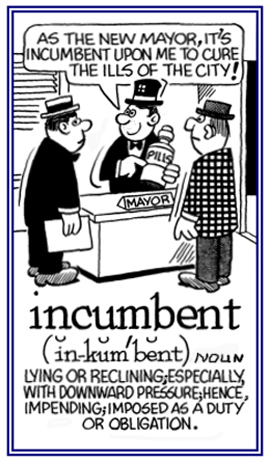cubi-, cub-, cumb-, cubit-
(Latin: to lie [in a horizontal position or posture]; to lie down, to lie asleep)
1. Something which visited people in nightmares and that was supposed to be an evil spirit who "lies" oppressively upon sleepers and it apples to any oppressive burden: The vision of an incubus disturbed Norbert's slumber and kept him awake.
2. That which causes a person much worry or anxiety; especially, an oppressive or nightmarish distress: Harvey's credit card charges were like an incubus or a source of anxiety and sleeplessness.
3. Etymology: from Late Latin (Augustine), from Latin incubo, "nightmare, one who lies down on (the sleeper)"; from incubare, "to lie upon".
2. That which causes a person much worry or anxiety; especially, an oppressive or nightmarish distress: Harvey's credit card charges were like an incubus or a source of anxiety and sleeplessness.
3. Etymology: from Late Latin (Augustine), from Latin incubo, "nightmare, one who lies down on (the sleeper)"; from incubare, "to lie upon".
1. The period of time during which someone occupies an official post.: Mr. Lawson, the politician, was striving to keep his incumbency.
2. An authorized position, especially in a church or a political organization: The incumbencies of the city councillors are subject to elections held every four years.
3. The holding of an office or ecclesiastical benefice: The incumbency of the church moderator has been reviewed every three years.
4. The duty which obliges a specific social course of action or decision: As a school principal, the incumbencies to ensure that the playgrounds are well supervised cannot be understated.
5. The position or term of the holder of an office or function: In the hierarchy of the organization, the incumbencies of each CEO were reviewed by the Board of Directors on an annual basis.
6. The time during which a person holds a particular office or duty: Many new jobs were created during the incumbency of the chief executive officer of the company.
2. An authorized position, especially in a church or a political organization: The incumbencies of the city councillors are subject to elections held every four years.
3. The holding of an office or ecclesiastical benefice: The incumbency of the church moderator has been reviewed every three years.
4. The duty which obliges a specific social course of action or decision: As a school principal, the incumbencies to ensure that the playgrounds are well supervised cannot be understated.
5. The position or term of the holder of an office or function: In the hierarchy of the organization, the incumbencies of each CEO were reviewed by the Board of Directors on an annual basis.
6. The time during which a person holds a particular office or duty: Many new jobs were created during the incumbency of the chief executive officer of the company.
1. Someone who is currently holding an official position; especially, in a church or political organization: Tomorrow on TV voters will be able to see the incumbent and his opponent in a debate.
2. A person who holds a political office or a position in some organization: Incumbents are often evaluated as to whether they are doing a good job or should be replaced with a new incumbent.
3. Etymology: from Latin incumben(t)s, "lying down on"; the present participle of incumbere, "to lean or lie on", from in-, "in, on" + cumbere, "to lie"; so, if something is leaning on anything, it is dependent on that object for its support.

© ALL rights are reserved.
Go to this Word A Day Revisited Index
2. A person who holds a political office or a position in some organization: Incumbents are often evaluated as to whether they are doing a good job or should be replaced with a new incumbent.
3. Etymology: from Latin incumben(t)s, "lying down on"; the present participle of incumbere, "to lean or lie on", from in-, "in, on" + cumbere, "to lie"; so, if something is leaning on anything, it is dependent on that object for its support.

Go to this Word A Day Revisited Index
so you can see more of Mickey Bach's cartoons.
incumbent (adjective), more incumbent, most incumbent
1. Relating to something which is necessary as a result of a duty, a responsibility, or an obligation: It is incumbent that everyone observes the responsibilities of his or her assigned tasks.
2. Descriptive of being responsible for doing what a politician is expected to accomplish: Some of the incumbent members of Congress will be required to run for their current positions again in the coming election.

© ALL rights are reserved.
Go to this Word A Day Revisited Index
2. Descriptive of being responsible for doing what a politician is expected to accomplish: Some of the incumbent members of Congress will be required to run for their current positions again in the coming election.

Go to this Word A Day Revisited Index
so you can see more of Mickey Bach's cartoons.
procumbent (adjective), more procumbent; most procumbent
1. Lying down with the face to the ground: On sunny afternoons, the dog was often in a procumbent situation under a shady tree.
2. Prone; lying face downward: Josh slipped on the ice and wound up in a procumbent position in a snow bank.
3. A reference to a plant stem that grows along the ground without taking root: The gardener was careful when cutting the grass to avoid trimming the procumbent trailers of the berry plants.
4. Etymology: from Latin procumbent-, present participle of procumbere "to fall forward"; from cumbere, "to lie down".
2. Prone; lying face downward: Josh slipped on the ice and wound up in a procumbent position in a snow bank.
3. A reference to a plant stem that grows along the ground without taking root: The gardener was careful when cutting the grass to avoid trimming the procumbent trailers of the berry plants.
4. Etymology: from Latin procumbent-, present participle of procumbere "to fall forward"; from cumbere, "to lie down".
1. The posture of leaning, reclining or lying: The recumbencies of the stems of those plants show them trailing along the ground without putting down any roots.
2. The act of resting or reposing in an idle state: Brian's recumbency indicated that he was resting in confidence after completing his project.
2. The act of resting or reposing in an idle state: Brian's recumbency indicated that he was resting in confidence after completing his project.
recumbent (adjective), more recumbent, most recumbent
1. Lying down in a position of comfort or rest: The Egyptian sphinx has the body of a recumbent lion just like the recumbent lions at the zoo.
2. A plant or animal part that rests or leans against something else: The recumbent posture of Robetta's cat suggested she was sound asleep and reposing on the pillow.
3. Referring to a slanting or reclining posture; such as, of the Romans during their meals: The mosaics on the wall showed the recumbent Romans while eating.
4. Reposing; inactive; idle: The recumbent hikers were resting before they had to go back to their camp.
2. A plant or animal part that rests or leans against something else: The recumbent posture of Robetta's cat suggested she was sound asleep and reposing on the pillow.
3. Referring to a slanting or reclining posture; such as, of the Romans during their meals: The mosaics on the wall showed the recumbent Romans while eating.
4. Reposing; inactive; idle: The recumbent hikers were resting before they had to go back to their camp.
succumb (verb), succumbs; succumbed; succumbing
1. To lose one's will to oppose something and to give up and accept anything that was first opposed to: After a vigorous debate about a new casino in the city, the mayor, Mr. Anderson, finally succumbed to the opinion of the majority of other officials.
2. To be reluctant to yield or to give into a change in one’s situation or condition: Andre fears that he must succumb to the wishes of his family and move from the city out into the country.
3. To use a less offensive term of stating that someone is dying: The young woman succumbed to the fatal injuries she had suffered in the car crash.

© ALL rights are reserved.

© ALL rights are reserved.

© ALL rights are reserved.
Go to this Word A Day Revisited Index
2. To be reluctant to yield or to give into a change in one’s situation or condition: Andre fears that he must succumb to the wishes of his family and move from the city out into the country.
3. To use a less offensive term of stating that someone is dying: The young woman succumbed to the fatal injuries she had suffered in the car crash.
In the context of a sickness, to succumb to an illness is to stop opposing it, to no longer battle it, but to give up and to die from it.
4. Etymology: from Latin succumbere, "to fall down, to sink down, to lie under, to yield."From Latin sub, "down" + -cumbere, "to take a reclining position."



Go to this Word A Day Revisited Index
so you can see more of Mickey Bach's cartoons.
1. That which is lying or resting on something else: In the fall, Joe placed a
superincumbency of leaves over the plants in the garden.
2. Those things that are situated above or overhanging someone or something else: When a person tells lies, there is always the superincumbency of the situation that he or she will be found out.
3. Something that is exerted from above; such as, pressure: The employee felt superincumbencies from his various supervisors.
4. A situation in which someone or something is lying or resting on or above an unspecified or a specific thing or place: The statue existed as a superincumbency, lying in a procumbent position on the grave.
2. Those things that are situated above or overhanging someone or something else: When a person tells lies, there is always the superincumbency of the situation that he or she will be found out.
3. Something that is exerted from above; such as, pressure: The employee felt superincumbencies from his various supervisors.
4. A situation in which someone or something is lying or resting on or above an unspecified or a specific thing or place: The statue existed as a superincumbency, lying in a procumbent position on the grave.
superincumbent (adjective), more superincumbent, most superincumbent
1. Lying or resting and usually exerting pressure on something else: Jim, the biologist, noticed that there were superincumbent layers of dead plants that hindered the decomposition of other plants.
2. A reference to something that is exerted from above: There were superincumbent insistences from the production managers to increase output.
2. A reference to something that is exerted from above: There were superincumbent insistences from the production managers to increase output.
superincumbently (adverb), more superincumbently, most superincumbently
Descriptive of lying on or resting on top of and usually exerting pressure on something else or on a person: After the tornado blew through the town, several people who were superincumbently covered by the wreckage of their homes were rescued; however, there were also some who did not survive.
Showing page 2 out of 2 pages of 26 main-word entries or main-word-entry groups.

